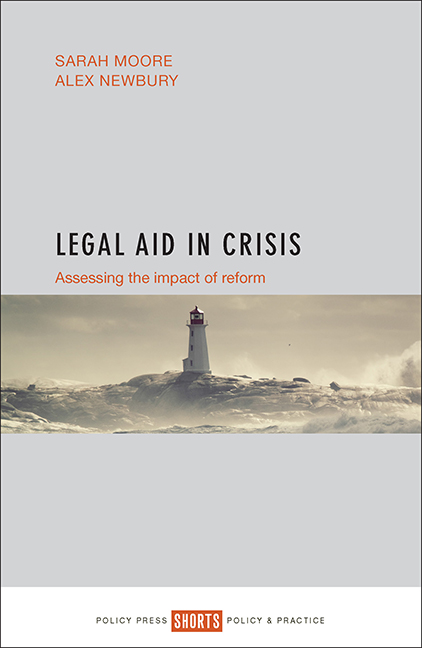Book contents
- Frontmatter
- Dedication
- Contents
- List of abbreviations
- Acknowledgements
- 1 Legal aid in crisis
- 2 Legal aid reform in historical and international perspective
- 3 Assessing the consequences of legal aid reform in England and Wales
- 4 Towards a holistic conception of legal aid
- 5 Refocusing the debate about legal aid
- List of statutes
- References
- Index
5 - Refocusing the debate about legal aid
Published online by Cambridge University Press: 05 April 2022
- Frontmatter
- Dedication
- Contents
- List of abbreviations
- Acknowledgements
- 1 Legal aid in crisis
- 2 Legal aid reform in historical and international perspective
- 3 Assessing the consequences of legal aid reform in England and Wales
- 4 Towards a holistic conception of legal aid
- 5 Refocusing the debate about legal aid
- List of statutes
- References
- Index
Summary
We started this book by suggesting that recent reforms represent a wholesale shift in the operation and meaning of legal aid in England and Wales. Once seen as a form of social welfare, since the mid-1980s legal aid has come to be framed as a benefit operating extrinsically to the legal system and understood in primarily economic terms. The most striking evidence of this is the focus in policy debates on the cost of legal aid to the taxpayer. This framing has become so dominant as to normalise the idea that England and Wales has an unacceptably expensive scheme. This is anathema to the original conception of legal aid as a provision available to nearly all, according to their need. The more important observation is that debates about the principles and purpose of legal aid have been squeezed out by the almost exclusive focus on spending. By way of conclusion, we suggest that the debate about legal aid should be refocused on four key issues: the social value and function of legal aid, the impact of the cuts on people seeking advice or access to justice, a broader conception of spending, and the diffuse effects of the cuts on justice and the legal system.
The social value of legal aid
Chapter Two pointed out that the recent reforms have been based on a shift in thinking whereby legal aid has come to be framed as a purely personal benefit, based on an autonomous decision to go to court. Recast in this way, the case for reducing coverage and eligibility is easy to make: why should taxpayers fund individuals to pursue their own personal interests in court? This represents the most significant shift in thinking about legal aid in its tumultuous 65-year history, and has provided the intellectual basis for its most comprehensive recomposition.
We believe that the official conception of legal aid is misguided, and for a number of reasons. First, there is an overemphasis on the degree of personal choice involved in pursuing a legal remedy. For the person dealing with the consequences of medical negligence the only route to compensation in our society is a legal one, or at the very least, it involves the threat of such action.
- Type
- Chapter
- Information
- Legal Aid in CrisisAssessing the Impact of Reform, pp. 69 - 78Publisher: Bristol University PressPrint publication year: 2017

